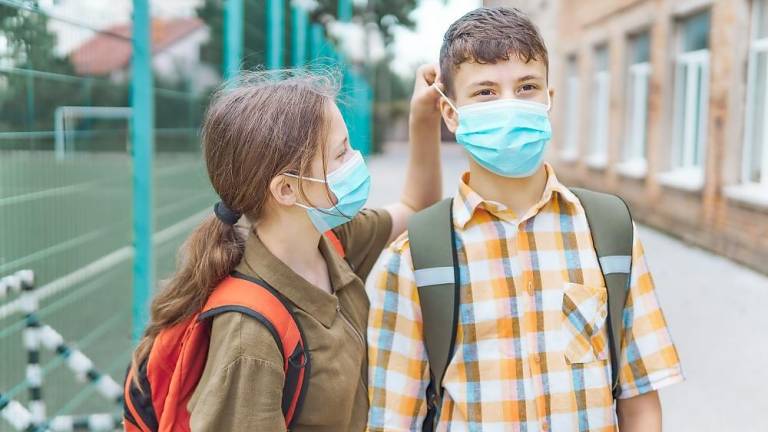Gov. Murphy says mask mandate in schools is ‘one we need to make’
Masking. The head of New Jersey’s chapter of the American Academy of Pediatrics said there is now a higher risk of Covid infection, especially for children ineligible for the vaccine.

(AP) Declaring that Covid-19 outbreaks will mushroom without a requirement for face coverings in classrooms, New Jersey Gov. Phil Murphy on Aug. 6 said he is requiring students, teachers and visitors in schools to wear masks indoors when the academic year begins.
“This is not an announcement that gives any of us — or me personally — any pleasure but as the school year approaches and with numbers rapidly increasing, it is the one we need to make,’’ Murphy, a Democrat running for reelection, said at Memorial Elementary in East Brunswick.
The rise of the delta variant was a factor in the decision, Murphy said, adding that the move would be temporary.
The announcement came alongside health, school and labor officials and just beyond the vocal protests outdoors from parents upset about the requirement.
“My child, my choice,’’ the crowd chanted, some through bullhorns. Others carried signs that said “Unmask our kids.’’
Dr. Jeanne Craft, the head of New Jersey’s chapter of the American Academy of Pediatrics, appeared alongside the governor and said the fact that children under 12 are not yet eligible for the vaccine is a factor in weighing the safety of reopening schools.
“Please get the vaccine if you are eligible, mask up,’’ she said. “Here in New Jersey we have seen a concerning rise in viral spread. A hopeful spring has become a worrisome summer. The conditions have changed, the risk is higher, especially for children.’’
New Jersey’s Covid-19 numbers have been climbing like other places around the country. The seven-day rolling average of new cases rose over the past two weeks from 555 on July 21 to 1,159 on Aug. 4, according to Johns Hopkins University.
Bridgette Veasy, a special education instructor and mom of a sixth- and a third-grader in Riverton, N.J., said she was ``thrilled`` about the new requirement.
“I’m thrilled because my children aren’t vaccinated, so working in a classroom, you know kids, when they sneeze they aim for your face,” she said.
Veasy said she understands why some parents aren’t happy about the mandate: The masks can be uncomfortable and no one likes the official mandates, she said.
Mandate resistance
“I know everyone has an opinion. I think as a parent you don’t want the government to tell you what to do with your kids. I understand the point. But it’s a little obtuse at this point. We’re in a pandemic,’’ she said.
Masks should be optional, said Melissa Alfieri-Collins, a registered nurse who attended an earlier rally of people skeptical about vaccine requirements.
“There needs to be a choice given to parents if they do not want to mask their children,’’ she said in a text message.
The climbing figures are part of a widespread fight with the contagious delta variant, along with vaccine holdouts, resulting in higher hospitalization rates across the country.
Other states are grappling with how to handle masking in the new school year.
Along with New Jersey, the list of states requiring masks in schools includes California, Louisiana, Oregon and Washington.
In Florida, two school districts have decided to require masks when children return to classrooms despite a statewide ban on masks by the governor.
In Arizona, at least three school districts are defying the state’s prohibition on masks, despite a recently enacted law barring face covering requirements.
None of the state’s roughly 600 school districts will be permitted to depart from the mandate, Murphy said Friday.
Unlike other places in the country, though, New Jersey’s vaccination rate is among the highest in the nation. Nationwide, the percentage of adults fully vaccinated against COVID-19 stands at nearly 61%. In New Jersey, the rate is 71%, according to the Centers for Disease Control and Prevention.
“Here in New Jersey we have seen a concerning rise in viral spread. A hopeful spring has become a worrisome summer. The conditions have changed, the risk is higher, especially for children.’’ Dr. Jeanne Craft